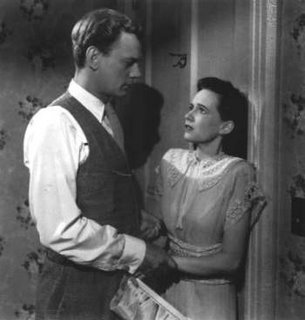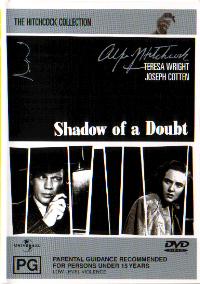Shadow of a Doubt
 Alfred Hitchcock said that of all of his own films, Shadow of a Doubt (1943) was his personal favourite. Its easy to see why. He takes a small American town in northern California and into it brings the darkness of "Uncle Charlie." Charlie (Joseph Cotton) is all smiles and charm on the surface but not far below that thin veneer he is a cynic, a confidence trickster and a hater of the human race. But is he a murderer? His niece and namesake Charlie (Teresa Wright) will have her naivete shattered as she learns more about her uncle than she ever wanted to know. In a rivetting scene at the family meal table Uncle Charlie's dark side comes out in Thornton Wilder's crisply written dialogue:
Alfred Hitchcock said that of all of his own films, Shadow of a Doubt (1943) was his personal favourite. Its easy to see why. He takes a small American town in northern California and into it brings the darkness of "Uncle Charlie." Charlie (Joseph Cotton) is all smiles and charm on the surface but not far below that thin veneer he is a cynic, a confidence trickster and a hater of the human race. But is he a murderer? His niece and namesake Charlie (Teresa Wright) will have her naivete shattered as she learns more about her uncle than she ever wanted to know. In a rivetting scene at the family meal table Uncle Charlie's dark side comes out in Thornton Wilder's crisply written dialogue:
"You think you know something, don't you? You think you're the clever little girl who knows something. There's so much you don't know, so much. What do you know, really? You're just an ordinary little girl, living in an ordinary little town. You wake up every morning of your life and you know perfectly well that there's nothing in the world to trouble you. You go through your ordinary little day, and at night you sleep your untroubled ordinary little sleep, filled with peaceful stupid dreams. And I brought you nightmares. Or did I? Or was it a silly, inexpert little lie? You live in a dream. You're a sleepwalker, blind. How do you know what the world is like? Do you know the world is a foul sty? Do you know, if you rip off the fronts of houses, you'd find swine? The world's a hell. What does it matter what happens in it? Wake up, Charlie. Use your wits. Learn something."
Here we see the nihilism that will lead a person to commit multiple murders because he has first depersonalised his victims and removed himself from the realm of moral accountability. In an other scene Uncle Charlie pontificates: "What's the use of looking backward? What's the use of looking ahead? Today's the thing - that's my philosophy. Today." The one who lives entirely in the now need not worry about judgement, retribution or accountability. A heinous act may be committed and then moved on from without guilt or qualm of conscience. The naive childlike innocence of the younger Charlie is slowly replaced by a harder realism. At the outset of the film the idea that such evil could exist in the world is unthinkable, and certainly could never come from her uncle whom she idolises. It's sad to see her lose that innocence but at the same time we know that she needs to do so if she is to develop an adult moral conscience.
The naive childlike innocence of the younger Charlie is slowly replaced by a harder realism. At the outset of the film the idea that such evil could exist in the world is unthinkable, and certainly could never come from her uncle whom she idolises. It's sad to see her lose that innocence but at the same time we know that she needs to do so if she is to develop an adult moral conscience.
There is an almost paedophilic relationship between the two as the older Charlie takes advantage of the adoration his niece shows him to ingratiate himself to her so that she will not unmask his dark past. As the younger Charlie realises his true identity the touch she once so dangerously coveted from him is something from which she now recoils. With courage she says no to his advances, unmasks his pretensions, and finds herself having to protect herself from becoming his next victim before, in a final showdown, he meets the fate we know he must meet if justice is to be served. This is a first rate thriller as only Hitch could make them. The innocence and charm of small town America has a shadow cast over it that will make you wonder what evil may lie in the heart of the seemingly innocuous. As with all the titles in Universal's Hitchock Collection, there is a great half-hour documentary on the DVD with many of the original cast of the film being interviewed as well as usual suspects such as daughter Pat Hitchock and Peter Bogdanovitch. Highly recomended. Four stars.
This is a first rate thriller as only Hitch could make them. The innocence and charm of small town America has a shadow cast over it that will make you wonder what evil may lie in the heart of the seemingly innocuous. As with all the titles in Universal's Hitchock Collection, there is a great half-hour documentary on the DVD with many of the original cast of the film being interviewed as well as usual suspects such as daughter Pat Hitchock and Peter Bogdanovitch. Highly recomended. Four stars.


3 comments:
I'll have to see it some time. I cant' say I've seen much hitchcock. I get scared very easily. Big wuss....
When it comes to making thrillers, is there any other director that can hold a candle to Alfred Hitchcock? I haven't seen a film of his that I didn't like.
Lynda emailed me this comment:
You could have pointed out the contrast of the beginning scene where Charlie is questioning her own existence and purpose in life, with the ending where she has learned the importance of having a firm philosophy and world view.
Post a Comment